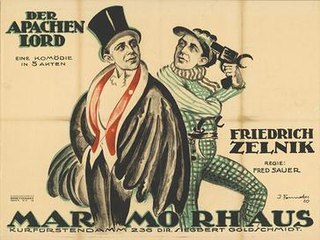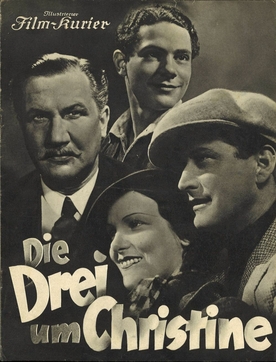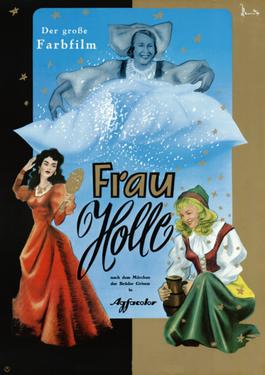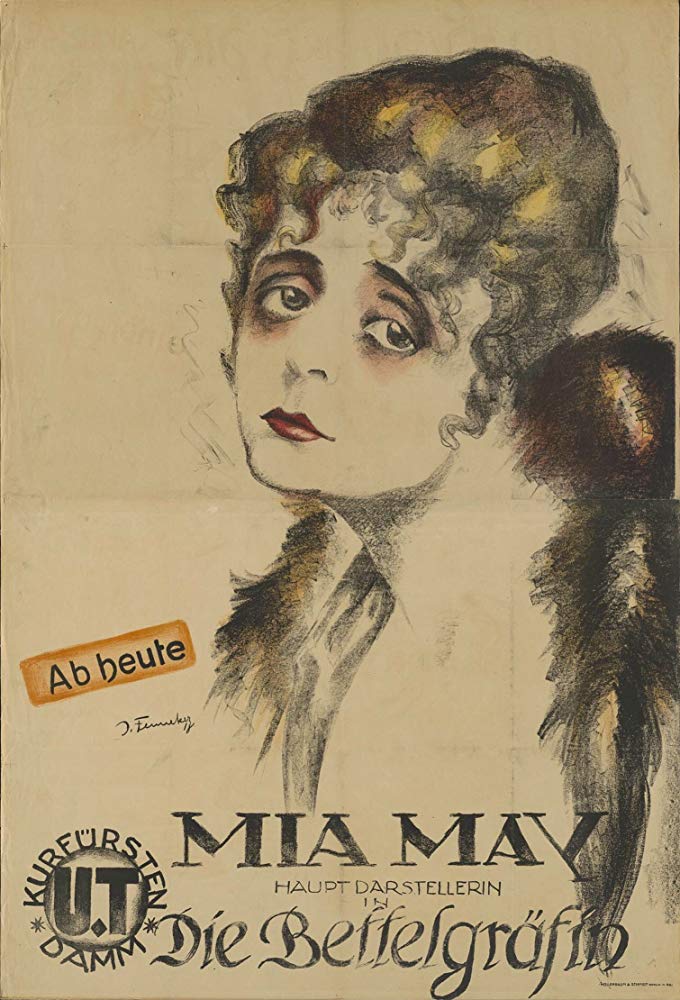
Bruno Decarli was a German stage and film actor.

Mia May was an Austrian actress. She was married to the Austrian film producer and director Joe May and appeared in 44 films between 1912 and 1924. Her daughter was the actress Eva May.

Heinrich Peer was an Austrian stage and film actor. He appeared in around a hundred films during the silent era.
The Street of Forgetting is a 1926 German silent film directed by Heinz Paul and starring Hella Moja, Henry Stuart and Ida Wüst.
What a Girl is a 1920 German silent film directed by Urban Gad and starring Hella Moja, Harry Liedtke and Ferry Sikla.
Fanny Carlsen was a German screenwriter of the silent era. As she was Jewish she was likely forced to emigrate with the Nazi Party's coming to power in 1933, although her exact fate is unknown.
The Crazy Marriage of Laló is a 1918 German silent film directed by Lupu Pick.
Marionettes of Desire is a 1919 German silent film directed by Lupu Pick and starring Bernd Aldor, Paul Biensfeldt and Edith Posca.

The Apache Chief is a 1920 German silent comedy film directed by Fred Sauer and starring Friedrich Zelnik, Wilhelm Diegelmann and Lya Mara.

Anna Karenina is a 1920 German silent historical film, directed by Frederic Zelnik and starring Lya Mara, Johannes Riemann, and Heinrich Peer. It is an adaptation of Leo Tolstoy's 1877 novel Anna Karenina. It premiered at the Marmorhaus in Berlin.
Old Mamsell's Secret is a 1925 German silent film directed by Paul Merzbach and starring Frida Richard, Guido Parish and Marcella Albani.

The Three Around Christine is a 1936 German comedy film directed by Hans Deppe and starring Maria Andergast, Hans Söhnker and Fritz Kampers. It was made at the Bavaria Studios in Munich. The film's sets were designed by the art director Max Seefelder.
Little Red Riding Hood is a 1953 West German family film directed by Fritz Genschow and starring Daniela Maris, Werner Stock and Rita-Maria Nowottnick. It is based on the fairy tale Little Red Riding Hood.
Hansel and Gretel is a 1954 West German family film directed by Fritz Genschow. It is based on the fairy tale Hansel and Gretel by the Brothers Grimm. It should not be confused either with another German film Hansel and Gretel or an American film Hansel and Gretel, both of which were released the same year.

Mother Holly or Mother Hulda is a 1954 West German family film directed by Fritz Genschow and starring Renée Stobrawa, Rita-Maria Nowotny and Werner Stock. It is based on the fairy tale Mother Hulda by the Brothers Grimm, part of a series of adaptations directed by Genschow. It was made using Agfacolor.

The Millionaire is a 1947 German comedy film directed by Robert A. Stemmle and starring Hans Moser, Annie Rosar and Hans Holt. It was made by the Munich-based Bavaria Film at the company's Bavaria Studios in the city. The film's sets were designed by the art director Hans Sohnle. The film was shot during the final stages of the Second World War, but wasn't released until 1947.
The Three Women of Urban Hell is a 1928 German silent film directed by Jaap Speyer and starring Mona Maris, Fred Doederlein, and Hilde Maroff. It was shot at the Marienfelde Studios of Terra Film in Berlin. The film's art direction was by Hans Jacoby.

Yoko Mizuki was a Japanese screenwriter. Born in Tokyo, she later graduated from Bunka Gakuin and began writing screenplays to support her family after her father died. Mizuki was active in the 1950s era of the Japanese studio system and is notable for her work with directors Tadashi Imai and Mikio Naruse. Her work had received several Best Screenplay Awards from Kinema Junpo and has been described in the book Women Screenwriters: An International Guide as "One of the most important and accomplished Japanese female screenwriters of all time".

The Beggar Countess is a 1918 German silent film directed by Joe May and Bruno Ziener and starring Mia May, Heinrich Peer, and Johannes Riemann.
Ruth Goetz was a German screenwriter active during the silent era. She was credited on more than 60 films over the course of her career.










